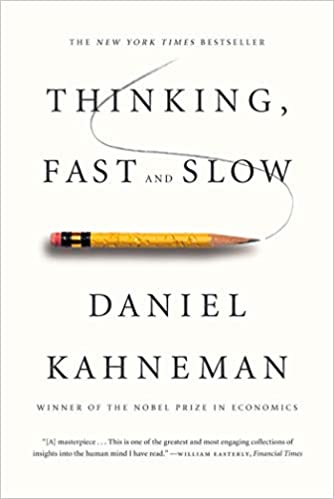Decision-making is an essential skill for all of us, but our decisions can have far-reaching consequences in business.
According to research, we can make around 35,000 decisions every day. Although this is a mind-boggling figure, most of these are relatively unimportant such as what to eat (a whopping 222.6 decisions on food choices alone according to a study carried out by Cornell University), what to wear, and other similar low-level decisions.
Nobody will be capable of making 35,000 high-level decisions a day in business. However, if you have major responsibilities, you need to ensure that your important decisions are right. So why do we make irrational decisions in business, and what can we do to prevent them? Let’s take a look.

Thinking Fast and Slow
by Daniel Kahneman
⏱ 12 minutes reading time
🎧 Audio version available
Decision Fatigue
We can’t make good decisions when we are fatigued. Carrying out too many tasks that require mental energy and focus is unsustainable for long periods of time, and when we get tired, our decision-making capability can be impacted. However mentally agile or intelligent you may be, nobody can perform at the top level when fatigued.
So if you do need to make important decisions, try and schedule meetings and important phone calls for when your energy levels are at their highest. That way, your mental processes are more efficient and more likely to lead to good decision-making.
Avoid over-optimism
It can be easy to get swept away on a cloud of optimism, especially if you are involved in new and exciting ways that promise great returns. The term for this is irrational exuberance. It is especially relevant in the stock or money market when people lose their heads and their money over the latest fantastic get rich scheme.
History has shown us that this is a common phenomenon. The South Sea Bubble, the Tulip craze in the Netherlands, saw people selling their homes to buy tulip bulbs in the 1600s. More recently, the Dot Com crash of the 90s and the Stock market collapse of the 2000s are all examples of over-optimism in decision making. Many otherwise canny Investors have made bad decisions to get involved in get-rich-quick schemes based on irrational exuberance.
Avoid herding behavior
Just because everyone seems to be favoring a course of action, it doesn’t mean that they are right. As with over-optimism, following the herd is not always a good idea. Try not to be swayed by herd opinion and if your gut instincts tell you this latest scheme or investment is unreliable, listen to it!
Keep your emotions in check
Emotional decisions are bad news in business, yet everyone falls prey to their own emotions sometimes when it comes to decision-making. However, decision-making is seriously impacted at times of peak emotion such as joy, anger, frustration, and excitement.
Never fire off an angry email or agree to a new scheme when you are not entirely in control of your emotions. Instead, take time to reflect upon your decision and, if necessary, sleep on it. Business decisions require a calm, analytical brain rather than a hot-headed response. So save your emotions for your world outside the business and keep calm when it comes to making decisions.
Don’t procrastinate; set a deadline
Although it is vital to keep a cool head for decision-making, this doesn’t mean you should procrastinate your decision for too long. We all tend to suffer from information overload, and it is easy to become overburdened with too many details.
Review the pertinent information and set a deadline if you have an important decision to make. Make the decision and then move on.
Avoid multi-tasking
We all carry out far more tasks at once than we believed possible in previous ages. However, research suggests that we cannot focus on two things at once without it having a 40% detrimental impact on both. If you need to make an important decision, set aside some time to concentrate on the matter at hand.
During this period of reflection, switch off social media and your phone. Every distraction will have a negative effect on your concentration and thought flow. You don’t necessarily need to spend too much time on doing this. Thinking time is quality time if you can carry it out without distractions and avoid the dangers of multi-tasking.
Avoid cognitive bias
We can make irrational decisions based on cognitive bias. These are often deep-seated and irrational beliefs based on our own assumptions and backgrounds, and often we don’t even realize we even have them. Examples of cognitive bias can cover a multitude of human experiences.
In worst-case scenarios, cognitive bias can lead to issues such as racism, such as being unwilling to hire staff because they are a different color to you. Alternatively, you may have had one bad experience when traveling with a particular airline and now are biased against ever using them again, based on the treatment of one individual employee.
The important point to remember about cognitive bias is that it is irrational, and if you don’t realize your own triggers, it makes your decision-making unreliable.
Becoming too attached to bad decisions
Sometimes we make bad decisions, but instead of recognizing them as such, we continue to try and make them work, thus compounding the problem. Throwing good money after bad or sunk cost fallacy is where we try and justify our past actions by continuing on a path that is already proven not to work. For example, buying new technology that doesn’t work for your company, and instead of selling it and cutting your losses, you continue to invest in it in order to make it work.
This comes down to pride and refusal to accept past mistakes in most cases. It is important not to base your future good decisions on a bad past decision, or it will lead to more problems in the future.
Don’t make decisions under the influence of alcohol or illegal drugs.
It should probably go without saying, but you should never make important decisions if you have been drinking or taking illegal drugs. Doing this impairs your judgment, so if you are at a business lunch, for example, drink only water if you are expected to make any important decision later. There is a reason why companies often woo potential partners with expensive drinks, dinners, and lunches. Don’t fall for it.
What Is Snapreads?

With the Snapreads app, you get the key insights from the best nonfiction books in minutes, not hours or days. Our experts transform these books into quick, memorable, easy-to-understand insights you can read when you have the time or listen to them on the go.


